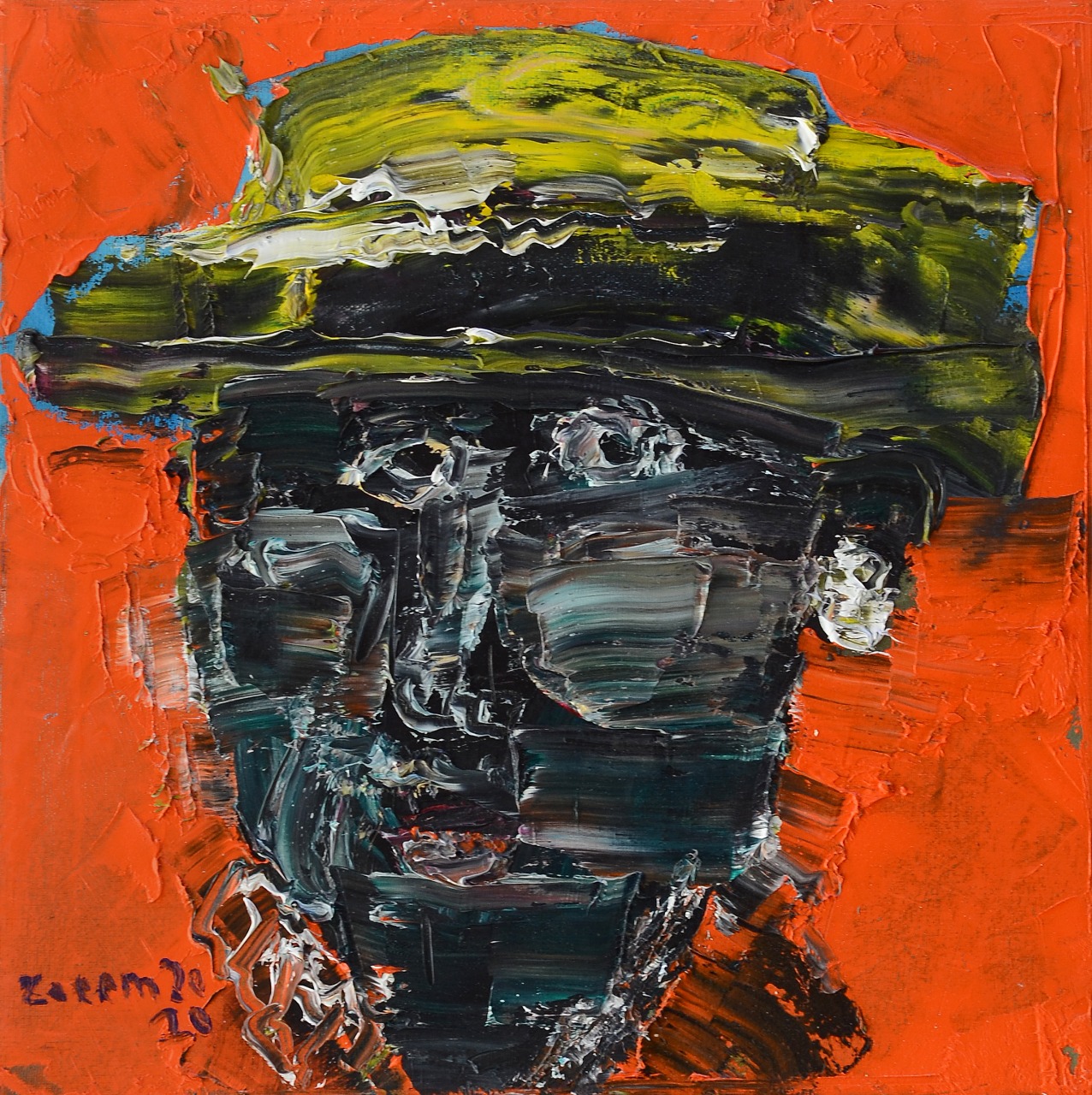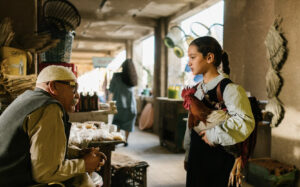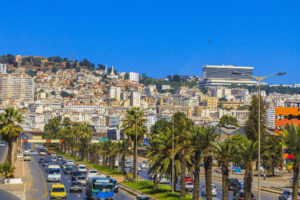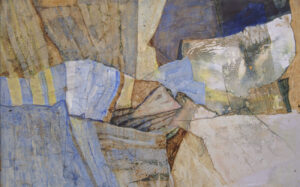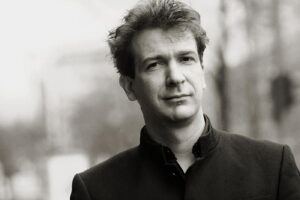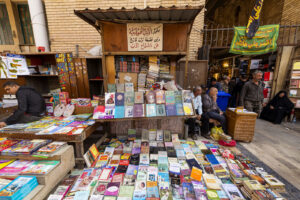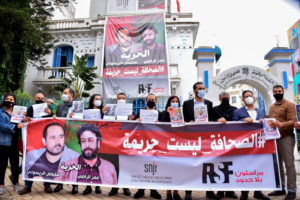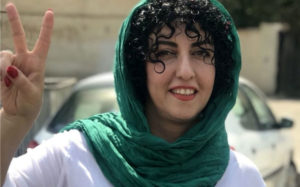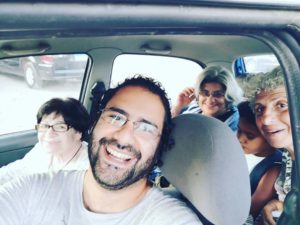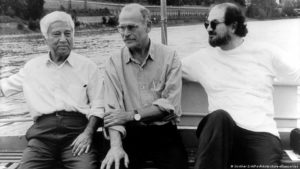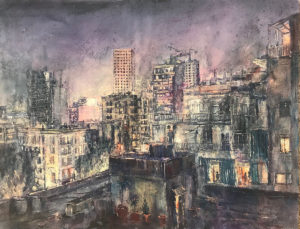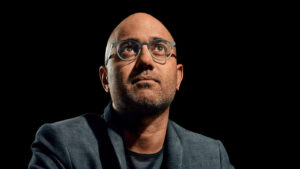An NYU professor who has frequently taught this Iraqi novel finds that two months into Trump 2.0, its significance has shifted considerably.
There’s a moment in Ahmed Saadawi’s Frankenstein in Baghdad where two goons who purport to be from “the traffic department” show up at the apartment of Hadi the junkman, who tells them he doesn’t even have a car. The men come inside anyway; they ask him questions about crimes he knows nothing about, then beat him senseless in order to discover if he’s “The Whatsisname” — the monster that’s been terrorizing Baghdad.
The men don’t know that Hadi created the creature, stitching together the body parts he found scattered in the Baghdad rubble, in order to assemble an entire corpse that he could bury on behalf of all the lost souls. Like Victor Frankenstein’s creature, however, Whatsisname has eluded his creator’s intentions and has decided for himself that his mission is to seek “vengeance for the innocent.” Hadi is the only person in Baghdad who knows the truth about Whatsisname, but it’s a truth he cannot reveal. Furious at Hadi’s silence, the men steal the few precious things in Hadi’s junk shop, as well as his small wad of cash. They leave Hadi bleeding and semi-conscious on the floor.

I regularly teach this novel as part of a first-year writing course at NYU, home to the largest international student population in the country (27,000 students across the entire university). When I first started teaching this book in the US a few years ago, students would say things like, “Well, over there, it’s a war, that’s what happens.” But this semester, two months into Trump 2.0, the novel reads very differently than it has in the past. “What do you think,” I asked my students. “Should people be allowed to come into your residence with no authorization and threaten to make you disappear unless you tell them what they want to hear?”
The students — the usual mix of diffidence and energy, all wearing sneakers and baggy jeans — are pretty clear that no, that shouldn’t happen. “There are supposed to be rules, and like, laws,” says one optimistic soul. Another student snorts, her disdain palpable. “Laws only work if there are consequences,” she says. “People have to be afraid of what happens if they break the law.” General nods of agreement greet her statement. Fear, apparently, is the go-to solution.
“It’s like Hadi doesn’t matter to them as a person,” says another student. And that comment unlocks the discussion. We’ve already read Mary Shelley’s Frankenstein and talked about how the novel portrays the dangers of “monsterizing” the Other. The students felt overwhelming sympathy for Frankenstein’s creature, who considers the ability to speak a “godlike science” and educates himself by reading Milton, Goethe, and Plutarch. The creature, I tell my classes, is basically a humanities student. And Victor Frankenstein, with his desire to “penetrate the recesses of nature” and single-minded pursuit of glory, is a STEM student.
Draw your own conclusions.
Creeping around the edges of our conversations, of course, are the actions of the current US president and his minions, as well as the current state of affairs on US universities. The day we discussed the attack on Hadi the junkman, Mahmoud Khalil had just been arrested by ICE, who are themselves skating on thin legal ice, given that Khalil — a green-card holder living in Columbia University housing and married to a US citizen — had led Palestinian protests at Columbia, thinking that he enjoyed the constitutional right to freedom of speech. But just as in Baghdad, where the American troops “[operated] with considerable independence and [could not] be held to account,” ordinary US citizens too seem to be living in a country where “as suddenly as the wind could shift [the troops] could throw you down a dark hole.” Rule of law, once regarded as the inviolate guardrail of US society, now seems fragile, a conceptual soap bubble that looks good but isn’t to be relied on.
No NYU student that I know of has yet been taken by ICE, which some of my colleagues attribute to the fact that The Trumpian Son attends NYU’s Stern School of Business.
NYU calls itself the global university, a university without walls, although as anyone in the neighborhood could tell you, the campus protests against Israel’s actions have resulted in walls, stanchions, and gates sprouting up all over, like daffodil harbingers of unrest. The university has made no public statement about Khalil’s detainment, leaving many to wonder what would happen if ICE took a member of the NYU community. Frankenstein in Baghdad illuminates the debilitating reality of living in and with perpetual uncertainty: will bombs drop on my street today, will a suicide bomber detonate himself outside my shop, will thugs show up at my door. That type of uncertainty used to seem purely theoretical to most, if not all, of my students.
I mention NYU because it’s where I teach, but sadly, frighteningly, friends and acquaintances at universities across the US (and around the world) have similar stories about the measures being taken by university administrations in the name of “safety,” a word that, like “freedom” and “democracy” gets used as a shield to prevent scrutiny. Kathy Hochul, the governor of New York State, for example, told the City University of New York (CUNY) to remove a job listing that advertised for a Palestinian studies professor, asking for a “thorough review…to ensure that antisemitic theories are not promoted in the classroom.” Outrage followed her actions, and questions about how a job listing can ensure what does or doesn’t get taught in the classroom — with the accompanying questions about who, exactly, will be watching what gets taught?
When I first started teaching this book in the US a few years ago, students would say things like, “Well, over there, it’s a war; that’s what happens.” But this semester, two months into Trump 2.0, the novel reads very differently than it has in the past. “What do you think,” I asked my students. “Should people be allowed to come into your residence with no authorization and threaten to make you disappear unless you tell them what they want to hear?”
Frankenstein in Baghdad spoofs such efforts through the actions of the “Department of Tracking and Pursuit,” headed by a former Baathist, Brigadier Majid. He has hired astrologers, seers, and people who commune with spirits, in order to predict crimes before they occur, find the would-be criminals, and arrest them — all in an effort to keep Baghdadis safe.
“The aim is to get control,” the Brigadier says; the truth of the stories his department tells is irrelevant. What matters is that people believe what they’re told. Truth, in this novel, is fungible, another casualty of war. Shelley’s novel does something similar through its creation of the frame story of Robert Walton, a would-be Arctic explorer, who rescues Victor Frankenstein from an ice floe, and writes to his sister about Frankenstein’s adventures, including Frankenstein’s report of talking with his Creature about the Creature’s misery as a result of being abandoned by his creator. Whose story has the most veracity? Whose story elicits our sympathy, and who emerges as the “real” monster? My students were fairly firm in their belief that Frankenstein is the monster, no matter that the Creature murdered innocent people.
“If you treat someone like they’re not human, then what can you expect,” one student said firmly.
When I told my classes that Elon Musk referred to people who opposed him as NPCs, a phrase from video game culture that refers to “non-player characters,” their response was a mix of outrage and amusement. They explained to me (a non-video game player) that NPCS have no importance; they exist only to serve the main players. “They’ve got no autonomy,” one girl said, and another added, “they’re expendable.”
“But also,” said another student, “that’s how kids talk. It’s like he wants to be cool. We use it like a joke, but he’s way too old for that.”
“It’s just super cringe,” said another, in the tones of absolute insult.
The “NPCs” in Frankenstein in Baghdad include all the people trying as best they can to live their lives in intolerable circumstances, struggling to eat and worship and keep their families together. They are aware that such government as exists is not to be trusted, but what recourse do they have? As Saadawi himself put it, in a 2018 interview, “the belief that I will get home safe and won’t be killed in an explosion is what enables me to leave home in the morning, although there is no logical calculation that supports this belief.”
And so it is beginning to feel in the US: we persevere in what we believe is important, although there is no logical calculation that says we will make a difference. Every day here, Trump has a new edict, a new way to erode bedrock principles and chip away at educational institutions. For instance, a few days ago, he released an order that would hobble libraries across the country, by reducing or stripping federal funding entirely.
What else can I do but continue teaching my students that not only do they have a voice, but that their voices matter? I tell them that we read fiction as a way to help us find insight into ourselves and our world; I ask them to think about where or how they find empathy for lives very unlike their own. We talk about how this novel gives voice to the doubts we might have, to our anxieties — and to how we can find hope. But increasingly, talking about the power of voice, the need for imagination, creativity, and empathy, the importance of archives and history, feels disingenuous at best — hypocritical and even dangerous, at worst — given the state of the university and the country.
Towards the end of Saadawi’s novel, one of the astrologers asks if they themselves weren’t in part responsible for the creation of the Whatsisname, who has come to terrorize the entire city. No one wants to answer his question; no one wants to be accountable. We know that Hadi created Whatsisname with all good intentions, but now Whatsisname is a vigilante, killing those who had killed the people whose body parts comprised his own. As he avenges one body part, however, it dissolves and needs to be replaced, and then that part needs revenge, and then the next and the next, until he finds himself killing innocent people for their specific body parts. He becomes an ouroboros of vengeance and violence. Before he becomes addicted to vengeance, Whatsisname says that he is “made up of body parts of people from diverse backgrounds — ethnicities, tribes, races, and social classes — I represent the impossible mix that never was achieved in the past. I’m the first true Iraqi citizen.”
Frankenstein in Baghdad responded to the disaster of Bush’s war in Iraq, but it offers us a way to think about where we are now and the dangers we face. Saadawi himself pointed out the problem: “fed by politicians and men of religion, people cling to pure, micro-identities, but we have to accept the diversity and pluralism in ourselves, and then accept the diversity in society.” Re-reading this novel now, I had a new thought: it’s not the murderousness of Whatsisname that the authorities find so frightening. It’s that he is comprised of all of us, in our messy, diverse differences. Difference, for Whatsisname, creates strength, while for the Trumps and Husseins of the world, strength depends on some illusory idea of purity.
After Hadi’s beating, his neighbor finds him, and although the two men dislike each other, Abu Salim nonetheless sends his two sons to tend to Hadi’s wounds. It’s a small but pivotal moment: how do we resist the chaos of a violent world run by despots? We tend to each other; we care for those around us; we refuse to be afraid of the monsters.



